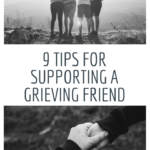Helping a Grieving Friend After a Loss
/ Supporting a Griever : Litsa Williams
People often don't know where to begin with helping a grieving friend. My guess is there is a flurry of questions running through your head: what can I possibly say or do that could help? And worse, what might I say or do that could upset, offend, or just make me seem like an insensitive putz? What does my friend need? Does my friend want me around or want to be left alone? Is it just easiest to give my friend space?
After a death, many people feel their friends avoid them or feel totally uncomfortable, and it is no wonder. Most of us have no idea what to do and are terrified that we will somehow make things worse instead of better. What could be scarier than the idea of trying to help your friend in their darkest hour, only to put your foot in your mouth, upset them, or annoy them?
Our #1 Tip: Don't look for a silver lining
Before we go any further, let’s get one thing straight – life sucks sometimes; there is no getting around it. The first step you must take in helping your grieving friend is to come to terms with that. You are not there to find a silver lining, give advice, or fix things. Grief is a long, ugly storm. You can’t slow the rain for them, or stop the wind and lightning. You better not even think of looking for a rainbow. Instead, grab your umbrella and share it with your friend if they are willing to use it. No more. No less. To understand this distinction, check out our post on how to be a grief supporter, instead of a comforter.
Okay, now that we have that out of the way, let’s talk nuts and bolts.
How to Help a Grieving Friend
Disclaimer: everyone is different. You can't compare grief. Painfully obvious, right? Despite the fact that Eleanor and I have been through our own losses and supported countless other people in their grief, we cannot give you a checklist of what will work for your friend or family member because we don’t know that person. But you do! You probably know them really well. So read over our suggestions, and then use your judgment, your friendship, and your common sense to guide you.
The questions I get about helping a grieving friend are broken into two main categories: what am I supposed to do immediately following a death (cards, flowers, service, etc) and what do I do to help a friend in the weeks, months, and years after a death.
If you are interested in the former, take a look here. We have some advice on the days immediately following a death.
If you have sent your sympathy card, made your casserole, attended the wake or memorial, and are left saying, “what now?” then you are on the right page. Thanks for being here, because many friends bail after the above checklist of obligations are completed. The sad reality is that after the service is over and the cards stop rolling in, many people grieving experience a profound feeling of isolation. They look around at their friends and family and feel everyone else has moved on. Now is when you may be the only one, or one of the very few, who are still around. Now is when it really counts. No pressure.
Share stories
When it feels like everyone else has moved on and forgotten, sharing your stories, photos, and memories of the person who has died can go a long way. If you didn’t know the person well, ask your friend to share their memories or pictures with you.
Remember dates
In case every day after a death isn’t bad enough, holidays, anniversaries, and birthdays are the worst of the worst. You can’t change that, but you can check-in and let your friend know you are thinking about them. Will they be alone for a major holiday? Invite them to dinner (but don’t be hurt or offended if they say no). You will need to make a conscious effort to remember other dates. Get your phone or day planner out right now and start writing down dates – their loved one’s birthday, death anniversary, wedding anniversary, etc. Make a note to check in when the first Christmas, Thanksgiving, Easter, or other holiday is coming up.
Get comfortable
Comfortable? Yes. Comfortable. Helping a grieving friend means getting comfortable with their grief. Comfortable with anger, comfortable with tears, comfortable with unreturned phone calls, forgotten obligations, existential crises, cigarettes, crises of faith, junk food, no food, dirty hair, sweat pants, a messy house, and anything else your grieving friend may throw your way. Get comfortable with the fact that...
- ...you may not be the one they want to talk to or spend time with.
- ...you can support them, but you can’t fix anything.
- ...they might not want your advice.
- ...they may not say thank you or be sensitive to challenges in your life.
Offer to help and be specific
Start by offering to help and asking what they need, so they can tell you what would be most helpful. When they say “nothing”, or that they don’t know, don't let that stope you. When we are grieving just figuring out what we need help with can feel impossible. So look around at what they need and what skills you have to offer and start offering, “I can watch your kids any evening this week”, “I can mow your lawn Saturday”, “I can help you sort through bills, insurance paperwork, social security information, etc”, “I can make dinner”, “I can take the kids to school, church, soccer, etc”.
Pick up on their cues
Helping a grieving friend means meeting them where they're at. Be an ear when they need it, but don’t force it. Some people may want to talk about their pain and their hurt. If they do, let them. Some people may want to just have a beer, watch a movie, and pretend everything is okay. If they do, just be there with them. Some days they may just want to be left alone. If they do, go home! If you’re not sure, ask.
Keep the invitations coming
Invite your friend to do things – go to lunch, to the movies, or to do whatever else you used to do. Let them know it is fine to say no, but also let them know you are going to keep the invitations coming unless they ask you to stop. It is surprising how far an invitation can go, even if someone is not ready to take you up on it. It means you are not scared off by their grief and you want to spend time with them. Perhaps most importantly, you’ll be there when they’re ready.
Acknowledge progress
It is probably a struggle for your friend to drag their grieving butt out of bed, much less get through a day. When you start to see progress, tell them. There is a good chance you will be the only one who does. Don’t be patronizing or insincere. Just be real. “Life sucks right now. I am so impressed you found the energy to clean the house”, “I know selling your mom’s car was really tough. I am really proud you got through it”.
Let them vent
We have said it before and we will say it again: grief makes your crazy. You start to irrationally hate people, places, and things. You become angry at close friends and well-intentioned church-members, coworkers, and neighbors. So if your friend needs to vent, let them vent. Don’t defend people or try to reason with them. Just let them vent and then let it go.
Help them get help
Most grievers make it through, one day at a time, with the help of friends and family. But every now and again people need more than that. As the weeks and months pass, if your friend does not seem to move forward, keep an eye out for red flags indicating that they may need professional support. Click here to learn about these red flags. If you think your friend needs help, do the legwork. Find some grief counselors and support groups in your area. Pass along the information and offer to watch their kids, give them a ride, or go with them for support. If your friend is not receptive to the idea, just leave the information with them and let them know if they change their mind you are there to help.
If you are looking for concrete, helpful ideas for being a good friend to a griever, don't miss our ebook: Guide to Supporting a Griever (without sticking your foot in your mouth).

We invite you to share your experiences, questions, and resource suggestions with the WYG community in the discussion section below.
We wrote a book!
After writing online articles for What’s Your Grief
for over a decade, we finally wrote a tangible,
real-life book!
What’s Your Grief? Lists to Help you Through Any Loss is for people experiencing any type of loss. This book discusses some of the most common grief experiences and breaks down psychological concepts to help you understand your thoughts and emotions. It also shares useful coping tools, and helps the reader reflect on their unique relationship with grief and loss.
You can find What’s Your Grief? Lists to Help you Through Any Loss wherever you buy books:





